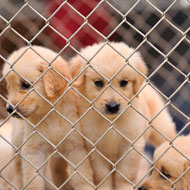Dogs Trust successfully 'smuggles' toy dog into UK

Dogs Trust first highlighted the influx of illegally traded puppies from Eastern Europe in November 2014, following a relaxation of the Pet Travel Scheme in 2012.
The Dogs Trust have managed to successfully 'smuggle' a stuffed toy dog into the UK, without a physical sight check, using a fake passport and fake microchip at the borders three times out of four attempts.
The revelation comes as the charity releases shocking findings of a follow-on undercover investigation into the puppy smuggling trade. The findings reveal that underage and under vaccinated puppies continue to travel illegally from Eastern Europe to Great Britain, destined to be sold online to unsuspecting members of the public by commercial breeders and dealers.
Dogs Trust first highlighted the influx of illegally traded puppies from Eastern Europe in November 2014, following a relaxation of the Pet Travel Scheme in 2012. These findings were presented to Defra, who declared the already-planned changes to the scheme (which came into force on 29 December 2014) as the solution. Dogs Trust had a strong suspicion that the changes would be ineffective, indeed the findings of the second investigation have proved this to be correct. The illegal puppy trade continues and the potential risks to both dog and human health and welfare remain.
Dogs Trust's second undercover investigation has gathered yet more evidence from breeders and vets in Lithuania and Romania, and the worrying ease in which commercial transporters can illegally bring puppies into the UK under a scheme designed for pet owners. Dogs Trust say that their experiment with the fake dog shows the urgent need for visual checks of pets travelling with passports. Without any physical sight check at the borders, corrupt dealers can smuggle sickly, underage, or undocumented puppies into the country, bringing with them a risk of disease.
Paula Boyden, veterinary director of Dogs Trust, said: “Dogs Trust has twice now presented Defra with evidence of the illegal puppy trade, both from those smuggling puppies and those exploiting the Pet Travel Scheme for profit. We have provided detailed recommendations which if implemented, would act as a great step forward in curbing the problem.
"We are hugely disappointed with Defra’s response. As our evidence demonstrates the Pet Travel Scheme amendments in December 2014 have been ineffective, we urge all the appropriate agencies to take the findings of our two investigations seriously. The implications of the puppy smuggling trade are huge; for consumers who are being duped and the puppies that suffer horribly, plus the risk of disease that is kicking at our shores.”
Paula adds: “We need a joined up approach and Government support, it cannot be left to animal welfare charities and concerned individuals to fight the puppy smuggling scandal alone.”
In a response to the findings of the investigation, a Defra spokesperson told MRCVSonline that there was no need for visual checks to be carried out:
“The UK has one of the toughest pet border checking regimes in the EU and the most reliable way to prevent illegal puppy smuggling is to scan the microchip and ensure that the dog has a matching passport. Every single dog travelling to Britain is checked in this way. Microchips can be scanned through carrier boxes which is why the dogs were not seen in this case.
“Responsibility for stopping the illegal movement of puppies begins in the country where they are born so we do have some concerns about the ability to gain fraudulent passports in some countries. The chief veterinary officer has already written to authorities in Lithuania and we will be investigating how fraudulent documents were obtained in this case."



 The veterinary mental health charity Vetlife is inviting the veterinary community to join it for a sponsored cold-water dip.
The veterinary mental health charity Vetlife is inviting the veterinary community to join it for a sponsored cold-water dip.